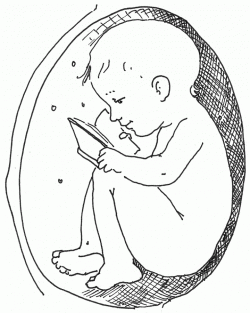Inside story: Fetus has enough light to read
Q. On a bright sunny day, who just might be the most surprising sharer of the light? Think "womb with a view." –U.G. Turner
A. It has long been known that fetuses can smell, taste and hear, prompting Marco Del Giudice of the University of Turin to wonder if they couldn't see as well, says New Scientist magazine. In particular, is there sufficient light for them to do so?
So he measured how much light could penetrate a typical woman's tummy and found that up to 1 percent of ambient light got through. In bright sunlight, this is light equivalent to that found in a typically lit house, enough that "The fetus may develop vision in the final two months of pregnancy."
Q. According to scientists, a Ouija board is not all trickery or illusory correlation. What's the real physiological effect to help explain its workings? –L. Channing
A. In case you've never used one, it allows players to ask questions of the spirit world and get answers from a planchette, or marker, that moves across a board marked with letters, numbers, and the words "yes," "no," "maybe" and "good-bye," say Stephen Macknik and Susana Martinez-Conde in Sleights of Mind.
It's believed that the players themselves unconsciously move the planchette via the "ideomotor effect," where voluntary muscles make tiny movements outside conscious awareness that can cause the marker to drift toward one letter, then another, and so on.
Though the movements are self-generated, the illusion of an outside force is compelling. Now not to be killjoys, but, "If you want to expose the illusion of the Ouija board, ask the players to put on blindfolds as they move the planchette. Their spelled out messages will be gibberish."
Q. You take your date out to dinner at a nice restaurant. Under what circumstances might you think twice before holding her hand? –D. Simpson
A. Can you believe this has actually been studied? Understandably, people conform to social norms more when others are watching (or they think others are watching), hoping to gain acceptance and approval, say Roy Baumeister and Brad Bushman in Social Psychology. This includes people washing their hands in a public restroom after using the toilet.
One study found that most women washed up (77 percent), but only if they thought someone else was in the restroom. Among loners, the number dropped to 39 percent. So if your date goes to the bathroom alone in an almost empty restaurant, you might want to hold off on hand holding until later.
Q. What's the new view on why champagne fizzes, an estimated 250,000 bubbles in a typical bottle? –R. Harlee
A. Recent science has revised the old theory of what puts the fizz into this "fizzy wine," says John Lloyd and John Mitchinson in The Book of General Ignorance.
It was long argued that the tiny imperfections in the glass prompted the bubbles, but new photographic evidence reveals the nicks and grooves are too small for the bubbles to latch on to; rather the microscopic particles of dust and fluff in the glass serve as condensation nuclei for the dissolved carbon dioxide.
And for a few final words on the subject: "My only regret in life is that I did not drink more champagne," declared the economist John Maynard Keynes.
The Russian author Anton Chekhov's last words were, "I haven't had champagne for a long time." Reportedly, German medical etiquette at one time even demanded that when there was no hope, the doctor would offer the patient a glass of champagne.
~
Send Strange questions to brothers Bill and Rich at [email protected]
